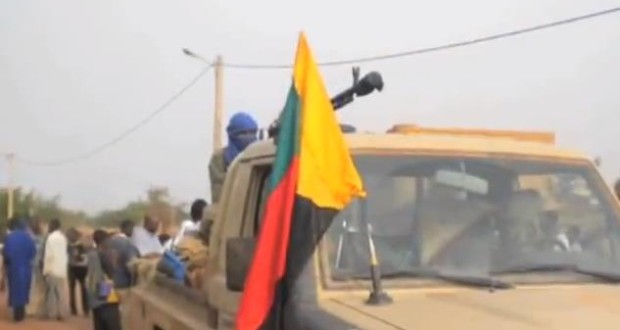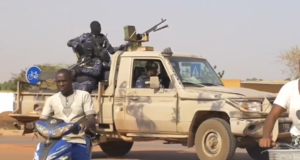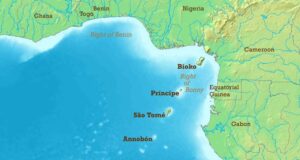By Thomas Hauschildt and Huma Malik.
17th June 2014, Human Rights and Conflict Resolution, Issue 2, No. 2.
Boko Haram, the militant Islamist group operating in Northern Nigeria, has been attracting increasing levels of attention as of May this year, when the group abducted 234 schoolgirls from Chibok, in the northern state of Borno. The girls’ abductions have been met with fierce condemnation from campaigners, the international community, and celebrities. The ‘Bring Back our Girls’ media campaign, which has included messages of support from Michelle Obama, Malala Yousef and others, has propelled Boko Haram into the spotlight once more. The United Nations has now blacklisted Boko Haram as an Al-Qaeda-linked terror group and imposed sanctions.
The group is becoming ever more daring, violent and prominent in recent years, and their latest attack has cemented their status as one of the most pressing security issues facing Nigeria today. Whereas this attack represents merely one example of numerous abductions, bombings and assassinations that engulf not only Borno but also wider parts of the country, the abduction emphasises once more the need to re-think the approach the Nigerian Government is taking in the fight against Boko Haram. Whilst security forces are vital to establish security, increased economic development and perhaps even amnesties are needed to stabilise the region.
Founded by Mohammed Yusuf in 2002, Boko Haram aims to establish an Islamic state in which any form of western influence – ranging from western style clothes and social activities to democratic elections – is rejected. The organisation’s original Arabic name ‘Jama’atu Ahlis Sunna Lidda’awati wal-Jihad’ means ‘People Committed to the Propagation of the Prophet’s Teachings and Jihad’. The group was later dubbed ‘Boko Haram’ which loosely translates to ‘western education is forbidden’. Initially, the group set up a mosque and a religious school which was popular especially among poorer families in northern Nigeria who considered the moral teachings of Koranic schools as an answer to economic problems and a lack of the rule of law.[1] However, the schools were also used to recruit students as jihadis to establish a wider movement opposing western influence.[2]
Since inception, Boko-Haram has grown from a relatively low level insurgency with small-scale attacks against security forces, places of worship and politicians, to an adaptive organization with broader operations. The group’s widening scale of activity has included terror attacks such as bombing campaigns, but also increasing cross border activity, including kidnappings of tourists and foreign expatriates. The group utilizes ransom funds from the Nigerian government and multinational firms working in oil-rich territory to fund their operations, and purchase weaponry. Moreover, a report issued by the British Government stated that an estimated $70 million were paid to Islamist kidnappers since 2009, over half of which went to al-Qaeda’s North African branch.[3] Boko Haram is believed to have obtained many of their arms from Libya which were smuggled out of the North African country to West Africa.
With the death of Mohammed Yusuf in police custody in 2009, the insurgence gained momentum and the group attacked an increasing number of targets, ranging from bus stops to the UN headquarter in Abuja, under the leadership of Yusuf’s deputy, Abubakar Shekau. In a response, the president of Nigeria, Goodluck Jonathan declared a state of emergency in the three northern states of Borno, Yobe and Adamawe to provide the military with additional powers to combat Boko Haram.
Notwithstanding successes in driving Boko Haram out of several urban areas, the group has continued to spread terror among the local population. Reports of civilian massacres attributed to Boko Haram have become a near daily occurrence in Nigeria’s north-east which has long served as the group’s operational stronghold. In 2014 alone, around 1500 deaths have been attributed to Boko Haram[4] with a further 250,000 people displaced as a result of the insurgency.[5]
Crumbling public support
In its nascent stage, Boko Haram turned into a movement providing a voice for people in northern Nigeria who felt disillusioned with their government.[6] Unemployment and chronic poverty accompanied by corruption and the government’s failure to address inequality, provided a breeding ground for a group that claimed to address peoples’ needs whilst simultaneously offering an Islamic source of identity embedded in northern nationalism. As Nigeria’s economy is now the largest in Africa, many people have not yet seen an improvement in their living standards and are still subject to rising inequality. The economic situation for a vast majority of northern Nigerians remains dire despite the country’s vast natural resources.[7] Economic wealth and social mobility is only available to a select few. Unemployment among young people is particularly high and with three quarters of its population below the age of 30, Nigeria cannot afford to marginalise its youth.[8]
In order to sustain its operation, the group requires local support in terms of recruitment, funding, shelter and the provision of intelligence. Attacks in recent years, however, have led to widespread opposition to the group among locals as Shekau’s leadership style has alienated large parts of the population.[9] Boko Haram is alienating the people it relies on the most and the group’s intention became evident in a recent video message in which Shekau declared that “ . . . our religion and our way of worship is nothing but killings, killings and killings”[10] and that Boko Haram is “not fighting the north, [they] are fighting the world.”[11]
A similar development could be witnessed in northern Uganda in the late 1980s and early 1990s when the Lord Resistance Army (LRA), led by Joseph Kony, lost public support and had to apply similar tactics as Boko Haram.[12] The LRA attracted in particular former rebels from anti-government groups, such as the Ugandan Peoples Democratic Army and the Holy Spirit Movement, who either laid down their arms or were defeated. However, the LRA was not able to achieve the same degree of localised popularity as these groups which were guided by strict moral guidelines to ensure popularity among locals. The decrease of local support also led to a smaller numbers of volunteers who joined the group. Moreover, the Amnesty Accord of 2000 granted amnesty to LRA fighters who laid down their weapons. As a consequence, the LRA struggled to retain fighters and started to recruit an increasing number of child soldiers. The loss of local support and opposition from vigilantes also led to an increase in violent LRA attacks which aimed to control the local population by spreading fear[13]. The parallels to the actions undertaken by Boko Haram are evident.
With the abduction of the school girls Boko Haram has committed a further act to alienate public support. Although people in northern Nigeria are disillusioned with the government, it has become difficult to sympathise with Boko Haram fighters who have turned into kidnappers and are killing an increasing number of civilians. The lack of support for Boko Haram has become increasingly evident as it relies on forced conscription and foreign fighters.[14] These measures were not necessary in the past when Boko Haram gained support from the local population.
Moreover, international attention is now firmly focused on Nigeria. Countries, such as China, France, the UK and US have offered their expertise and President Goodluck Jonathan and the presidents of Benin, Chad, Cameroon and Niger met in Paris and agreed to combat Boko Haram on a coordinated basis, sharing in particular surveillance and gathered. Most recently, the Nigerian government claimed to have acquired intelligence on the location of the abducted schoolgirls, however they also stated they are not prepared to use force for fear of putting the girls lives at risk.
Declining support by local communities, paired with increased efforts by the Nigerian government and international partners might herald the demise of Boko Haram and hamper any attempt by future groups to spread terror.
The need to accompany hard with soft power
As the Nigerian military struggled to protect villages and towns in north-eastern Nigeria, locals have taken up arms. In a recent attack on three villages in the Kala-Balge district of Borno, local vigilantes have repelled an attack by Boko Haram and killed an estimated 200 militants.[15] Such local approaches to self-defence do not come as a surprise as security forces are often accused of being corrupt, ill-equipped and unable to respond in a timely fashion.[16] Furthermore, robust military responses to the insurgency have led to significant collateral damage, costing the lives of a large number of civilians. The high number of people killed by government forces further increases grievances among the local population, and renders attempts at winning local support futile.
Human Rights Watch stated that:
“Government security forces have been implicated in serious human rights violations in response to the Boko Haram violence. During raids in communities where attacks occurred in 2012, soldiers have allegedly burned homes and executed Boko Haram suspects or residents with no apparent links to the groups. Nigerian authorities have rarely brought anyone to justice for these crimes.”[17]
Similar statements were made by Amnesty International about the killings of civilians with no proven link to Boko Haram.[18] Whereas the kidnapping of over 200 girls and continuous terror attacks will not win Boko Haram the hearts and minds of the local population, heavy handed approaches by the security forces are not likely to win the support of locals either. This is not to say, that the government should not increase the number of boots on the ground to protect the people, but military operations need to significantly reduce civilian casualties. Crimes committed by security forces need to be addressed and impunity must be halted.
Insurgencies cannot be defeated through military means alone, its supporters need to be convinced that being on the side of the government promises higher benefits to supporting Boko Haram. Here, the international community can play an important role. NATO members in particular have gained significant experience in counter-insurgency missions in Afghanistan and can advise on the need for a well-balanced approach involving soft and hard power alike. Thus it is important that the international community does not focus solely on rescuing the abducted girls, but a holistic approach addressing economical and political root causes is needed. A long term strategy involving socio-economic reforms is essential if the government is hoping to win over the population of northern Nigeria, and correct the legacy of state neglect of the Northern region.
Poverty accompanied by radicalisation is the breeding ground for terrorism and whereas the Nigerian government needs to make a genuine effort to address inequality, religious leaders as well as families can play an essential role in tackling radicalisation efforts by Boko Haram leaders. Moreover, corruption has widely hampered the fight against poverty and led to a lack of trust toward the government’s willingness and ability to fight inequality. A zero-tolerance approach to corruption accompanied by civic education of officials and population alike about the devastating effects of corruption needs to be implemented. Government and society need to address causes rather than symptoms of terrorism.
Amnesties: A vital option in the conflict resolution tool box
In the light of an unsuccessful military approach, there have recently been talks about an amnesty law for Boko Haram fighters. In return for surrendering their arms, Boko Haram fighters are planned to be offered a series of re-integration programmes. A similar approach was pursued to end violence in the Niger Delta in 2009.
Although amnesties are highly controversial, they could offer a viable alternative for Boko Haram fighters and subsequently reduce the manpower and fighting capabilities of the group. Furthermore, currently it is unlikely that Boko Haram will be defeated through military means alone. Thus, amnesties as applied in Uganda and Nigeria’s Niger Delta might serve as an incentive to end the conflict.
However, for an amnesty law to benefit from legitimacy it needs to be embedded into a wider reconciliation process, involving political elites of all parties, members of the civil society and, most importantly, victims and perpetrators. Individual demands for justice, recognition and truth need to be balanced with the wider need for peace and reconciliation. Providing victims the opportunity to address perpetrators directly is of great importance and will ensure at least a minimal degree of accountability as well as fulfilling the victims’ needs for justice. Families who have suffered losses need also to be provided with financial support from the government.
Furthermore, a roadmap for de-radicalisation and reintegration of the ex-Boko Haram members should also be part of the wider reconciliation process. The provision of further education and skills training which enable young people to earn a living would form a pivotal part. Moreover, child soldiers in particular who have been kidnapped and forced to fight should not be considered as perpetrators, but as victims of Boko Haram who require substantial psychological support. However, leading individuals who bear the most responsibility should be excluded from any amnesty provision and tried within local and civil courts.
An amnesty law would not only significantly reduce the fighting capabilities of Boko Haram, it would also offer its members an opportunity to return to their communities and contribute to the ending this protracted conflict. The LRA was severely weakened by an amnesty law and although highly disputed, it is a tool of conflict resolution that is worth considering. Nonetheless, such a step is only a viable option if Boko Haram realises that it will not achieve its objective through force. Thus the offer of amnesties needs to be accompanied with economic development and stringent security measures.
[1] Thomson, V., 2012, ‘Boko Haram and Islamic Fundamentalism in Nigeria’,
Global Security Studies, Volume 3, Issue 3, pp.46-60, P.50, http://globalsecuritystudies.com/Thomson%20Boko%20Haram.pdf
[2] BBC, 2014, ‘Who are Nigeria’s Boko Haram Islamists’, http://www.bbc.co.uk/news/world-africa-13809501
[3] Cummings, R, 2014, ‘What Does the Tactic of Foreign Kidnappings Tell us about Boko Haram?’ http://thinkafricapress.com/nigeria/what-do-foreign-kidnappings-tell-us-about-boko-haram-islamist-militants-cameroon
[4] Amnesty International, 2014, ‘Nigeria: War crimes and crimes against humanity as violence escalates in north-east’, http://www.amnesty.org/en/news/nigeria-war-crimes-and-crimes-against-humanity-violence-escalates-north-east-2014-03-31
[5]BBC, 2014, ‘Nigeria’s Boko Haram insurgency ‘affects millions”, http://www.bbc.co.uk/news/world-africa-26754947
[6] Akinola ,O, 2013, International Centre for Counter Terrorism, ‘Nigeria’s Troubled North:
Interrogating the Drivers of Public Support for Boko Haram, p.3, http://www.icct.nl/download/file/ICCT-Olojo-Nigerias-Troubled-North-October-2013.pdf
[7]In 2010 Nigeria had a Gini index of 48.8. The Gini index measures the extent to which the distribution of income or consumption expenditure among individuals or households within an economy deviates from a perfectly equal distribution. A Gini index of 0 represents perfect equality, while an index of 100 implies perfect inequality. World Bank, 2014 http://data.worldbank.org/indicator/SI.POV.GINI/
[8] Akinola Olojo, 2013, International Centre for Counter Terrorism, ‘Nigeria’s Troubled North:
Interrogating the Drivers of Public Support for Boko Haram, p.7, http://www.icct.nl/download/file/ICCT-Olojo-Nigerias-Troubled-North-October-2013.pdf
[9] Akinola, O, 2013, International Centre for Counter Terrorism, ‘Nigeria’s Troubled North:
Interrogating the Drivers of Public Support for Boko Haram, pp.11-12, http://www.icct.nl/download/file/ICCT-Olojo-Nigerias-Troubled-North-October-2013.pdf
[10] allAfrica, 2014, ‘Nigeria: Shekau Claims Responsibility for Attack On Giwa Barracks’, http://allafrica.com/stories/201403250267.html
[11] Newissues, 2014, full text of message from the Boko Haram leader, Abubakar Shekau.
http://www.newissuesmagazine.com/full-text-latest-message-boko-haram-leader-abubakar-shekau/
[12] Vinci, A., 2006, ‘The Strategic Use of Fear by the Lord’s Resistance Army’, Small Wars and Insurgencies, 16, 3, pp. 360-381, P. 365 http://www.tandfonline.com/doi/abs/10.1080/09592310500221336
[13] Vinci, A., 2006, ‘The Strategic Use of Fear by the Lord’s Resistance Army’, Small Wars and Insurgencies, 16, 3, pp. 360-381, P. 370 http://www.tandfonline.com/doi/abs/10.1080/09592310500221336
[14] Akinola ,O, 2013, International Centre for Counter Terrorism, ‘Nigeria’s Troubled North:
Interrogating the Drivers of Public Support for Boko Haram, pp.11-12, http://www.icct.nl/download/file/ICCT-Olojo-Nigerias-Troubled-North-October-2013.pdf
[15] BBC, 2014, ‘Nigerian village vigilantes ‘repel Boko Haram attack’, http://www.bbc.co.uk/news/world-africa-27412057
[16] Washington Post, 2014, ‘How people in northeast Nigeria protect themselves’,
http://www.washingtonpost.com/blogs/monkey-cage/wp/2014/05/15/how-people-in-northeast-nigeria-protect-themselves/
[17] Human Rights Watch, 2013, Nigeria, http://www.hrw.org/world-report/2013/country-chapters/nigeria
[18] Amnesty International, 2014, ‘Nigeria: War crimes and crimes against humanity as violence escalates in north-east’, http://www.amnesty.org/en/news/nigeria-war-crimes-and-crimes-against-humanity-violence-escalates-north-east-2014-03-31
Thomas Hauschildt is contactable at: Thomas.Hauschildt@hscentre.org
Huma Malik is contactable at: Huma.Malik@hscentre.org
Please cite this article as:
Hauschildt, T., Malik, H. (2014) ‘The fight against Boko Haram and why hard power alone will not suffice’. Human Security Centre, Human Rights and Conflict Resolution, Issue 2, No. 2.
 Human Security Centre Human Rights and International Security Research
Human Security Centre Human Rights and International Security Research




